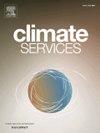Adaptation to climate change by the indigenous farmers in the western Tarai of Nepal
IF 4
3区 环境科学与生态学
Q2 ENVIRONMENTAL SCIENCES
引用次数: 0
Abstract
Challenges posed by climate change are more severe for indigenous farmers in developing countries. For them, their rich socio-culture constructs their livelihood capitals, which also indicate their adaptive capacity (AC). Hence, understanding their adaptation strategies to climate change and their adoption in relation to AC is urgently needed. All 229 Tharu households residing in two rural villages in the Western Tarai of Nepal were surveyed using the semi-structured questionnaire complemented by two focused group discussions and 10 key informant interviews with leading farmers and concerned stakeholders. The questionnaire included three sections, namely; agriculture, climate change, and livelihoods along with the household characteristics. We found that AC varies with space and gender. The geographical location of the village and households with access to service and market have better AC. Women had lower AC, particularly human capital and natural capital of livelihoods. The Tharu consider multiple adaptation strategies to deal with the farming in changed climatic contexts. Adopting modern agriculture technology in major cereal crops and continuing landraces with traditional practices are prominent adaptation strategies. This signifies the importance of indigenous knowledge and practice in climate change adaptation for the Tharu. Consequently, they are also contributing to the conservation of valuable landraces. Landholding, access to water pumps, extension services, and weather information are the significantly important factors associated with the adoption of adaptation strategies by the Tharu. Thus, the interventions must be designed to increase access to extension services, improve farmers’ access to water pumps, and secure tenurial arrangements to adopt climate change adaptation measures effectively.
尼泊尔西部塔拉伊地区土著农民对气候变化的适应
气候变化给发展中国家的土著农民带来的挑战更为严峻。对他们来说,丰富的社会文化构成了他们的生计资本,这也表明了他们的适应能力。因此,迫切需要了解它们对气候变化的适应策略及其与AC的关系。对居住在尼泊尔西部塔拉伊两个农村的229户塔鲁人家庭进行了半结构化问卷调查,辅以两次重点小组讨论和与主要农民和相关利益相关者的10次关键信息提供者访谈。问卷包括三个部分,分别是;农业、气候变化、生计以及家庭特征。我们发现AC随空间和性别而变化。村庄的地理位置和获得服务和市场的家庭的AC较好。妇女的AC较低,特别是人力资本和生计的自然资本。塔鲁人考虑多种适应策略来应对气候变化背景下的农业。在主要谷类作物中采用现代农业技术和继续采用传统做法的地方品种是突出的适应策略。这表明土著知识和实践对塔鲁人适应气候变化的重要性。因此,他们也为保护有价值的本土物种做出了贡献。土地占有、获得水泵、推广服务和天气信息是与塔鲁人采用适应战略相关的重要因素。因此,干预措施的设计必须能够增加获得推广服务的机会,改善农民获得水泵的机会,并确保权利人的安排,以便有效地采取气候变化适应措施。
本文章由计算机程序翻译,如有差异,请以英文原文为准。
求助全文
约1分钟内获得全文
求助全文
来源期刊

Climate Services
Multiple-
CiteScore
5.30
自引率
15.60%
发文量
62
期刊介绍:
The journal Climate Services publishes research with a focus on science-based and user-specific climate information underpinning climate services, ultimately to assist society to adapt to climate change. Climate Services brings science and practice closer together. The journal addresses both researchers in the field of climate service research, and stakeholders and practitioners interested in or already applying climate services. It serves as a means of communication, dialogue and exchange between researchers and stakeholders. Climate services pioneers novel research areas that directly refer to how climate information can be applied in methodologies and tools for adaptation to climate change. It publishes best practice examples, case studies as well as theories, methods and data analysis with a clear connection to climate services. The focus of the published work is often multi-disciplinary, case-specific, tailored to specific sectors and strongly application-oriented. To offer a suitable outlet for such studies, Climate Services journal introduced a new section in the research article type. The research article contains a classical scientific part as well as a section with easily understandable practical implications for policy makers and practitioners. The journal''s focus is on the use and usability of climate information for adaptation purposes underpinning climate services.
 求助内容:
求助内容: 应助结果提醒方式:
应助结果提醒方式:


